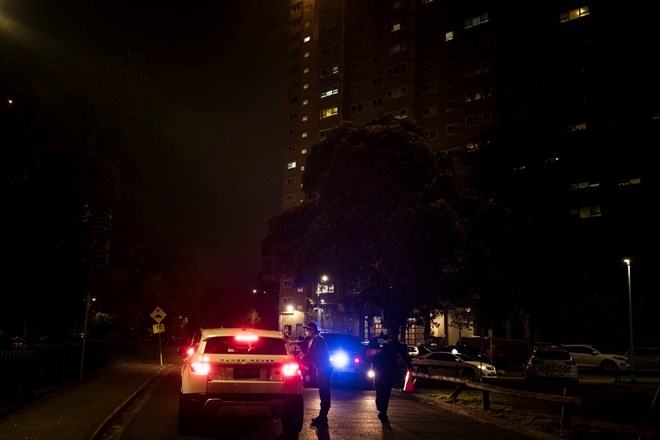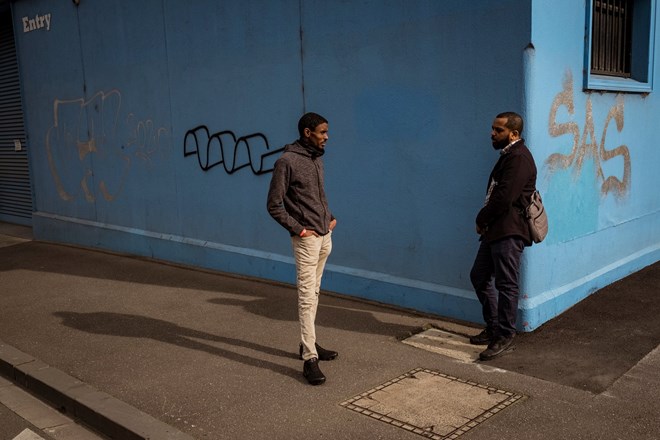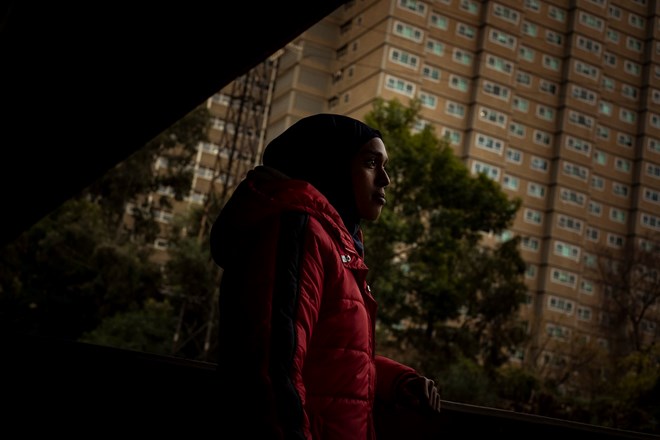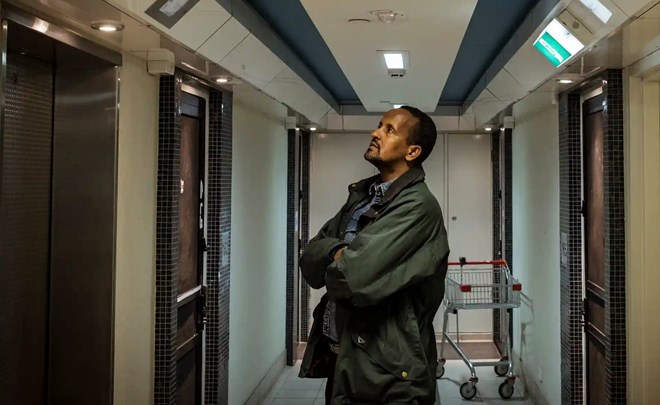
By James Button and Julie Szego. Photography by Christopher Hopkins
Sunday July 12, 2020
There is a schism between older African migrants – who think Australia is ‘the greatest country in the world’ – and those who came here young or grew up here

Police are seen guarding the entrance to the Flemington Commission Housing complex.
Photograph: Christopher Hopkins/The Guardian
Nor Shanino would get into big debates with his father, Idris, an Eritrean refugee, about the police and the country.
“His perception of Australia is so different from me and anyone younger than me,” Nor says. “He looks at it as the greatest country in the world. He’s like, ‘OK, if someone says something racist to you or the cops pull you over, you think that’s bad? I’ve seen Gaddafi’s men just shoot people on the street. Here, if I pick up the phone, the ambulance, the police, the fire department will show up in minutes. In Libya, in Saudi, I’ve seen people die because they can’t get an ambulance, because they don’t have the money to get into the hospital.’”
Nor says his father recently “went on this one-hour rant. He got this letter from the Australian tax office saying 20% of your taxes went to transportation, schools, whatever. And he says, ‘I’ve lived in countries where people are paying ridiculous amounts of taxes. They don’t have a single paved road. There’s no electricity. There’s nothing. You’re so lucky to be here, you’re so blessed.’ The fact that your government is telling you what they’re doing with the money they take from you was just mind-boggling to him.”
Nor’s sister, Hiba, recalls her parents attending town hall meetings about relations between the Flemington public housing estate, where the family lived, and the police. There were rowdy debates about “police stopping African kids”. The police brutality cases drew attention to the lives of young Africans in Melbourne, and opened up new roles for Nor and his friend Ahmed Dini. Ahmed’s victory in court in 2007 – in which he was awarded $70,000 compensation for an alleged police assault – was the moment that led him to “love this country more than any in the world”, he later told a journalist.
Ahmed was named as a Victorian Local Hero in the 2012 Australian of the Year awards, and got a job as a multicultural officer at the Essendon football club. Nor went from working on the floor at Safeway and Woolworths and running a small cleaning business to doing work with the Multicultural Commission and the Victorian Department of Premier and Cabinet. He attended dinners and events of “the Jewish Council, the Chinese League, the Irish Chamber of Commerce”. He and Ahmed set up their own non-profit organisation, the Ubuntu Project, to advance their work advising on multicultural youth issues. The young men both sit on the implementation committee of the Victorian government’s African Communities Action Plan.The government and multicultural organisations had chosen their targets well. Nor and Ahmed had lived the lives of young Africans in Melbourne, but they also brought the drive and optimism of immigrants. Ahmed had spent five years in a Kenyan refugee camp, seen daily rapes by the militia, an imam murdered in broad daylight. Nor’s experience was nothing like as fraught, but in public housing in the small town of Vaxjo in central Sweden, he had grown up with refugees from all over the world, had heard his father’s stories of being arrested by Libyan police, beaten into a coma and jailed for months, over a case of mistaken identity. At the age of seven Nor had seen far-right Swedish nationalists march through his town carrying Nazi flags. Immigration gave he and Ahmed a wider perspective that younger African Australians don’t always have.
These generational divides emerged again during this week’s lockdown of the Flemington and North Melbourne flats because of coronavirus. While older people were generally more accepting of the severe restrictions, young people born here were more likely to see their rights infringed by the official approach, and Nor, Ahmed and others tried to be a bridge between the two.

Community health worker Ahmed Dini and colleague Nor Shanino discuss a proposed call centre to help with the mental health and concerns of residents in Flemington and North Melbourne housing commission flats.
Photograph: Christopher Hopkins/The Guardian
“Ahmed and I talk about this a lot,” says Nor. “Because we came here as refugees at the age of 10, we knew we were outsiders and we were OK with it. But these kids who are born in Royal Women’s hospital, all they know is Australia. When their parents take them back to Eritrea, Somalia, they’re outsiders. They don’t understand nothing there. They’re westerners, that’s how they’re seen. And then they come back here and they’re still outsiders. I think that creates resentment.”Being unable to talk to their parents exacerbates the sense of estrangement. “We have a lot of kids that can barely put together a sentence in Arabic or Somali, and their parents can barely put together a sentence in English. Those of us who came as immigrants knew our mother tongue. We’re not genius at it, but we’re able to have a basic conversation with our parent. But for a lot of kids now that doesn’t really happen.” If they experience racism, “they can’t talk to their parents because, they say, ‘I don’t want to put that stress on them when I know they can’t do anything about it. So I just have to suck it up.’ And this is a 14-year-old kid saying that to you.”
It worries Nor that young people of African background are not registering to vote. Or that “young kids who grow up here, especially in public housing, by the ages of 12 or 13 will say to me, ‘I would never go to uni. It is a waste of time. Australia is a racist country. You think someone’s going to give me a corporate job? You think I could ever be a lawyer in this country? A journalist? No.’ That’s at 12. I always tell people that’s dangerous, because why would they even try at school? Even if he’s going to grow out of it by 18 or 19, his options are very limited now. I said to one kid, ‘Why do you think that? You’re a kid. What do you know?’ And he’s like, ‘My sister’s got two degrees. She’s been looking for a job for two years.’ And I say, ‘Maybe your application wasn’t that good. Maybe you need to work on your interview skills. Now you dismiss everything by saying everyone’s racist. Trust me, I’ve seen racists. I’ve had to sit down and watch blatant racists sit there with a smile on their face. I’ve been beaten up by Victoria police officers. But that’s not always the case.’
“Yes there is bias, all those issues. But also, [young African Australians] are very defensive now. If I don’t get something, it’s because I’m black, because that person is a racist. If you’re only within the bubble, all you hear about is how white people are racists and how they don’t give opportunities. And as soon as you don’t get that one, or two, or three opportunities, that is evidence of what you already thought.”
Nor spoke recently to a group of young African Australian VCE students. “I said, ‘Yes, OK, there is racism. There is discrimination. But there are also companies that want to appear to be multicultural. So, sometimes, if you’re really smart about it, you can use the fact that you wear a scarf, or that you’re black or whatever, as a selling point. I can sit there and say, ‘My life was so difficult, we were eight kids, and we had one TV’. Or I can say, ‘I speak English and Arabic and Swedish, and growing up among eight kids, I had to learn how to work in a team’. A lot of them had never thought about that.”
Nor and Ahmed have become brokers of sorts between parts of the African community and the mainstream, trying to explain one to the other. In Melbourne, they talk to non-African Australians who like to think they live in one of the world’s most multicultural cities but who, when pressed, admit they have never met an African, or a Muslim. “Eventually they get comfortable enough and they come back with questions: ‘I read this thing about Muslims – is it true?’”
But they also talk to people like Ali, a Somali friend of Nor’s older brother. “We’re having coffee and he’s like, ‘What, you guys think you’re Australians?’ Ahmed said, ‘I am Australian, what do you mean?’ And he’s like, ‘You’re not white.’ And Ahmed’s like, ‘I don’t need to be white to be Australian. The first Australians were not white, what are you talking about? And I don’t need anyone to recognise me as an Australian, just like I don’t need someone to recognise me as a Muslim or as a Somali. I am what I am, whether you like it or not.’
“And it just went back and forth. I said to [Ali] at one point, ‘When you go overseas and get in trouble, all of a sudden you’re an Australian, right?’ And he laughed because that’s true. But he kept saying, ‘They will never accept you, or your children, no matter what you think.’ At that point I realised what he was basically saying: ‘You’re going to be out there grovelling, wanting to be accepted.’ And I said, ‘Ali, is it a matter of reject them before they reject you?’ And he’s like, ‘Yes, basically’. And that’s it. I’m going to get rejected, so, you know what? I’ll reject them first. Everyone’s racist. The country’s terrible. All these things.”
So, Nor says, these young people end up thinking they’re not really Somali, or Eritrean, and also don’t see themselves as accepted in this country. “To go from that to radicalisation or joining a street gang, or carrying out robberies – you’re halfway there.”
In place of local identities, young people often adopt a global black identity, Nor says. The rise of Black Lives Matter in Australia is a striking example. “A lot of young people, if you come to the estate, they dress, talk, walk, everything, like African Americans. More recently, it’s British rap. They mix American slang and British slang and I’m like, ‘Am I getting old? I have no idea what you just said’. When we grew up, we used Australian terminology, Aussie slang.”
The online world is driving these changes. When Nor was a boy, there were no smart phones, the internet was still relatively peripheral to young lives. He and his friends were outside, playing sport, having scuffles, learning how to debate in groups. As they got older, the world radiated outwards: from the Flemington flats, to public housing in North Melbourne and Carlton, to the city and state, to Australia and then, finally, the world. Today the direction is almost reversed: the online environment brings the world to young people first.
“For them, from a very young age, everything is global. This happened in America. This happened in Finland. They will be online in a global Eritrean youth discussion group – kids of their own age and background but who have no idea what public housing is. Or they’ll read of a shooting in America, or something that happened in South Africa, and they’ll say, ‘See, this is happening everywhere, this is how the world is’. And I’m like, ‘Hold on, you can’t take something in a completely different ecosystem and superimpose it on Melbourne, are you serious? You create new things that don’t really exist’. So their access to information is very different. I think they’ll have a big problem with this whole Facebook algorithm and echo chamber, where you just hear what you believe.”
Farhio Nur, whose family are Somalian refugees, says her teenage cousins living on the estate also seem more introverted than she was at their age. Yes, the girls still band together, attend mosque. But Farhio suspects they “aren’t enjoying the things we enjoyed – sports, barbecues, community events, hanging in the park. They’re much more into social media, into their appearance. They wear so much makeup.”

Farhio Nur has recently moved out of her family’s flat in the Flemington complex to nearby Ascot Vale.
Photograph: Christopher Hopkins/The Guardian
Hiba says the young people “have illusions they don’t belong, that we don’t want them. People are destroying themselves in their own little corner”. In the past, problems with youth were more visible, and communities were motivated to respond collectively, she says. But the current approach to drug abuse and young people’s immersion in angry online worlds is more hands-off. “Our community – Somali, Eritrean – doesn’t discuss these issues enough,” she says. “The parents are lost. Even our local mosques aren’t talking about them.”
Compared to 15 years ago police sirens are heard less frequently around inner-city estates. But Hamdi Ali – who came to Australia as an 18-year-old after fleeing a rebellious Somali enclave in Ethiopia that had been devastated by war, and now lives in the Carlton flats – identifies tension between the men of his generation, who came to Australia as adults, and younger men, now in their 20s and 30s, who grew up here. The younger men take their cues from African-American culture, “seeing minute discrimination here and having this strong belief it’s the same thing”, he says. That belief makes some young men turn inwards, convinced there’s little point in studying and job-seeking because racism will inevitably hold them back.
Ali wants young people to learn what their parents suffered at home, the brutal dictatorships and even worse, lawlessness. (In Somalia, General Siad Barre ruled with arbitrary violence until 1991 when his overthrow triggered a prolonged civil war.)
Fathers struggle to tell their sons that because of such experiences, “they came to Australia very thankfully. Somalis are very nomadic; formal instruction hardly takes place. The younger person gets angry and starts putting their parents down – like Australian kids do,” Ali chuckles. These differences, now spanning three generations, are marked.
On the Flemington estate, gangsta rap incites rage against racist cops and corrupt authorities. “They’re listening to rap music that’s telling kids to take pills and hold guns, telling them their lives will change [for the better] if they do drugs,” Farhio says. Some boys succumb to the myth and their lives do indeed change, but not for the better.

Hamdi Ali, a resident at the 141 Nicholson Street flats, waits for the elevator on the sixth floor. Photograph: Christopher Hopkins/The Guardian
Ali says the Islamic prohibition against alcohol and drug use makes it hard to tackle a growing problem among young men. “One parent told me about a relative with an ice issue. He went to a rehabilitation place where there were a number of East African youths. But it’s very taboo, people won’t talk about it.”
The issue of problems going underground or online emerged when Nor and Ahmed advised the state government about preventing crime and Islamist radicalisation. “There was this fear that imams are teaching it at mosques. No, it’s online. We said that every person that’s gone [to fight in Somalia or Syria], their parents and friends, everyone, tells you they were not engaged. They weren’t working or studying, not even part-time; not one of them was playing sports. They were at home, on the internet and gaming a lot.”
Nor says that the handful of Somali men from Sydney, Melbourne and Perth who went to Somalia to join the jihadi group Al-Shabab all came from the suburbs – none from inner-city public housing. “And they were very isolated. They were in this bubble of frustration and anger and disappointment. And our advice was, ‘You want to prevent that? You want to prevent crime? Fund community sporting institutions’.”
In 2009, Ahmed created the Australian Somali Football Association, an annual competition in the week around Christmas. Ten years later, it is still going. In front of up to 5,000 spectators, eight teams from Melbourne and two from New Zealand face off on grounds in Melbourne’s inner-city. The grand final is usually played at JJ Holland Park in Kensington. “It helps get kids off the street; they have to train, come on time,” Farhio says. “For a week-and-a-half in a year, everyone is united in one purpose.”
This is the fourth in a six-part series on life inside Melbourne’s high-rise public housing. These articles were commissioned by the Scanlon Foundation Research Institute as part of a series on immigration and multiculturalism in Australia.